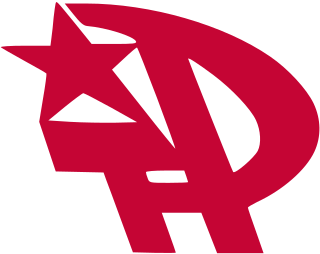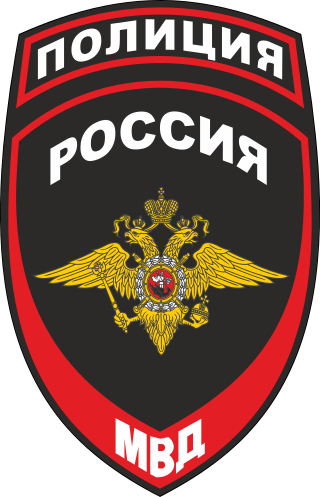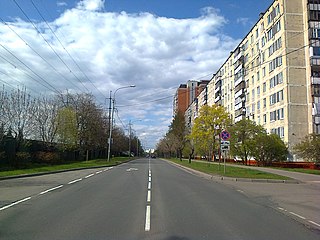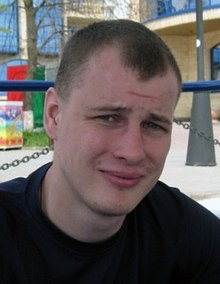
Militsiya were the police forces in the Soviet Union until 1991, in several Eastern Bloc countries (1945–1992), and in the non-aligned SFR Yugoslavia (1945–1992). The term Militsiya continues to be used in common and sometimes official usage in some of the individual former Soviet republics such as Belarus, Tajikistan, Uzbekistan and Kyrgyzstan, as well as in the partially recognised or unrecognised republics of Abkhazia, South Ossetia, Transnistria, DNR and LNR. In Russian law enforcement, the term remained official usage until 2011.

OMON is a system of special police units within the National Guard of Russia. It previously operated within the structures of the Soviet and Russian Ministries of Internal Affairs (MVD). Originating as the special forces unit of the Soviet Militsiya in 1988, it has played major roles in several armed conflicts during and following the 1991 dissolution of the Soviet Union.

Riot police are police who are organized, deployed, trained or equipped to confront crowds, protests or riots.

The 2005 raid on Nalchik was a raid by a large group of Islamic militants on Nalchik, in the Kabardino-Balkar Republic (KBR) of southern Russia, on 13 October 2005.

The Berkut was the Ukrainian system of special police of the Ukrainian Militsiya within the Ministry of Internal Affairs. The agency was formed in 1992, shortly after the dissolution of the Soviet Union, as the successor to the Ukrainian SSR's OMON.
The Luzhniki disaster was a deadly crowd crush that took place at the Grand Sports Arena of the Central Lenin Stadium in Moscow during the 1982–83 UEFA Cup match between FC Spartak Moscow and HFC Haarlem on 20 October 1982. According to the official enquiry, 66 FC Spartak Moscow fans, mostly adolescents, died in the crush, which made it Russia's worst sporting disaster. The number of fatalities in this crush was not officially revealed until seven years later, in 1989. Until then, this figure varied in press reports from 3 to 340 fatalities. The circumstances of this disaster are similar to those of the second Ibrox disaster in Scotland.

The Dissenters' March was a series of Russian opposition protests that took place on December 16, 2006 in Moscow, on March 3, 2007 in Saint Petersburg, on March 24, 2007 in Nizhny Novgorod, on April 14, 2007 for the second time in Moscow, on April 15, 2007 again in Saint Petersburg, on May 18, 2007 in Samara, and on May 19, 2007 in Chelyabinsk. Some of them were featured in various media outlets.

In the Russian Federation, law enforcement is the responsibility of a variety of different agencies. The Russian police are the primary law enforcement agency, with the Investigative Committee of Russia as the main investigative agency, and the Federal Security Service (FSB) as the main domestic security agency.

Labour Russia is a hard-line communist movement in Russia. It was established in 1992 by decision of the January 1992 plenum of the Russian Communist Workers Party (RKRP). The founding congress took place on 25 October 1992. Labour Russia was officially registered by the Ministry of Justice of the Russian Federation on 9 January 1996, then deregistered on 16 March 2004.
Ukrainian People's Militsiya or the Ukrainian National Militsiya, was a paramilitary formation created by the Organization of Ukrainian Nationalists (OUN) in the General Government territory of occupied Poland and later in the Reichskommissariat Ukraine during World War II. It was set up in the course of Operation Barbarossa, the 1941 invasion of the Soviet Union.

The Police of Russia is the national law-enforcement agency in Russia, operating under the Ministry of Internal Affairs from September 8, [O.S. 20] 1802. It was established June 7, [O.S. 18] 1718 by decree from Peter the Great and in 2011, replacing the Militsiya, the former police service.

The Moscow Police, officially the Main Directorate of Internal Affairs of the City of Moscow, is the police force for Moscow, Russia.

Yuriy Mikhailovich Chervochkin was a Russian opposition activist. He was murdered at the age of 22. His case shook Russian opposition because he was attacked two days before Dissenters' March and some observers remained convinced that perpetrators of the crime were members of Russian Militsiya.

The Ministry of Internal Affairs, also called the Ministry of the Interior, abbreviated VKD, is the interior ministry of the government of Tajikistan. It oversees the Presidential National Guard and the Internal Troops. Since 2012, the Minister of Internal Affairs has been Lieutenant General Ramazon Rahimov. He is responsible for youth crime prevention and working to lower youth crime rates in the country. The law "On Police" was adopted on 7 April 2004 by the Supreme Assembly of Tajikistan to define the duties of the interior ministry.

On 13 October 2013, riots in Biryulyovo Zapadnoye, a district in southern Moscow, erupted. The riots were in response to news that Egor Shcherbakov, a 25-year-old man who was killed on 10 October, had allegedly been attacked by a migrant who "might have come from Central Asia or the Caucasus". The footage of Shcherbakov being stabbed was circulated by news agencies.

The 2017–2018 Russian protests were a long series of countrywide street protest actions and demonstrations in the Russian Federation, which were primarily concerned with suppressing corruption in the Russian government and abandoning the planned increase of retirement age.
Aleksandr Petrovich Kharitonov is a Ukrainian politician who appeared in media during the pro-Russian unrest in March 2014. He is the first leader of Russian separatists forces in Luhansk region. He is one of the pioneers and founders of the Russian Spring in the Eastern Ukraine.

The Zubr Special Purpose Police Detachment of the Ministry of Internal Affairs of Russia was created in February 2006 on the basis of the OMON GUVD in the Moscow Region that existed since 1988. It reports directly to the Minister of the Interior, and is based in Shchelkovo-7 near Moscow. Zubr was made up of officers drawn from the OMON riot police near Moscow and numbered about 430 people. Zubr is equipped with armored personnel carriers, Tigrs and other special equipment, and includes snipers and dog handlers.
OMON or AMAP is a Belarusian law enforcement force under the Ministry of Internal Affairs of Belarus (MUS).

Protests in Russia began on 23 January 2021 in support of the opposition leader Alexei Navalny after he was immediately detained upon returning to Russia after being sent to Germany for treatment following his poisoning the previous year. Days before protests began, a film by Navalny and his Anti-Corruption Foundation (FBK) called Putin's Palace, which revolves around the connection between president Vladimir Putin and a palace allegedly being built for him, was released.


















